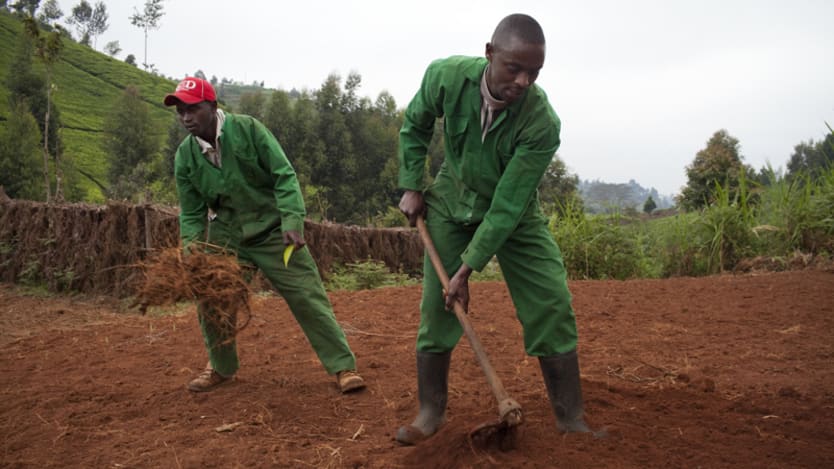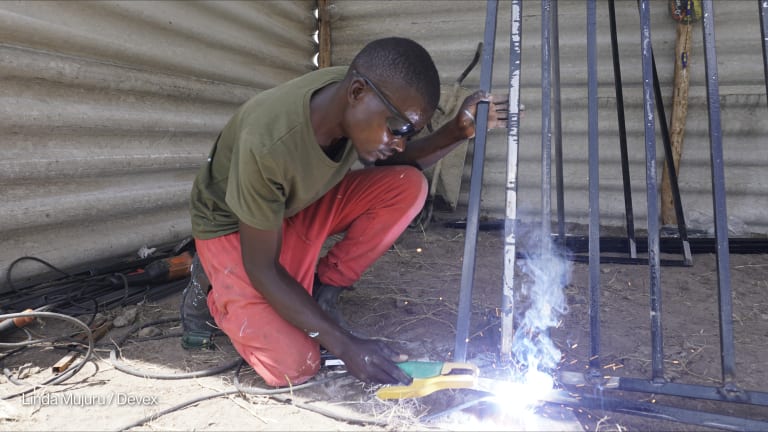
Across Africa, the appetite for farming and venturing into farming as a business is evident. From Namibia to Zambia to Botswana, young people are flocking into agribusiness. Governments and business entities are responding to their interest. In Nigeria, for instance, the federal government, in partnership with the African Development Bank, is preparing to launch an ambitious 280 million Enable Youth Programme. It is an initiative that hopes to fund over 1000 youth-led agricultural enterprises in an effort to continue making agriculture attractive to youth.
We need more efforts like this. Youth are a key demographic upon which to focus, as they make up 70 percent of Africa’s population. Africa’s youth are innovative, tech savvy, creative, optimistic and entrepreneurial — qualities that can help transform African agriculture and serve as the foundation needed to build a sustainable, strong 21st century youth-led agriculture economy.
4 insights for better youth training in rural sub-Saharan Africa
A recent report by the MasterCard Foundation exposes gaps in African capacity-building strategies and offers suggestions on how to better approach employment trainings to reach more youth in Africa, specifically in rural populations.
Africa should be excited that this generation still cares about farming and sees a future in farming. Continent-wide, the age of farmers has been increasing. Therefore, there is need to entice more young people into farming, to ensure that there is enough food grown to feed the growing population. To best capitalize on the younger generation’s interest in farming, Africa needs to build strong mechanisms to support youth-led, agriculture-focused ventures.
First and foremost, there is a need for new youth farmers to go through adequate training on the ventures they are launching. Trainings should include an in-depth information on best practices, including writing solid business plans and ongoing mentoring to ensure that they are on track.
These trainings can be done by country governments, NGOs, universities and private companies that are involved in the agriculture value-chain. These trainings can be marketed through national newspapers and other media channels, including radio, television and social networks.
At the moment, there are several organizations that work hand in hand with young farmers to ensure that they have access to valuable current information that they need to carry out profitable ventures. TechnoServe, for example, is an initiative that trains and equips young people in East Africa with the skills and tools they need to succeed in their ventures. The DAIN Network is another initiative that helps train early-stage, youth-led agri-businesses across Africa, and equips them with the resources they need to be successful.
Secondly, new young farmers need to be connected both regionally and across regions to other youths that are engaged in similar ventures. Social networks including Facebook, Whatsapp groups and other online forums are some of the most efficient ways in which new young farmers can network and keep up with other farmers. Across Africa, there is no dearth of such networks. Mkulima Young, for example, is a digital platform that allows farmers to connect with each other. Young Professionals for Agricultural Development is another example of a global online platform with active members drawn from many African countries. Through this platform, young farmers can interact, swap stories and openly share about their daily challenges and breakthroughs.
Innovations to jumpstart the agricultural revolution
As part of the Spring Meetings, the World Bank convened young innovators with new ideas about how to make the agriculture and food systems work better for farmers, consumers and the environment. Here are four pioneering projects.
By connecting with other youth farmers through these platforms, they can access and exchange real time information on best agricultural practices and recent seed varieties information they can use and apply in their newly formed agricultural businesses. At the same time, new farmers can access new markets for their products. Mary Gitau, one of the successful new young farmers in Kenya, uses the Mkulima Young platform to find markets for her products, for instance.
Thirdly, new youth-led farming ventures will require access to capital to engage in meaningful ventures. Recently, the MasterCard Foundation, in partnership with Michigan State University, launched a $15 million initiative that will help young people from Tanzania and Nigeria to access funds needed to support and grow their ventures. More efforts like this can greatly benefit youth-led farming ventures.
Fourthly, there is the need to continue showcasing successful youth-led agriculture efforts. This can happen through television shows or other forms of media. In Burkina Faso, for example, Inoussa Maiga is tapping into the power of television to showcase successful youth-led agriculture ventures, while inspiring others that are considering venturing into farming. Digital newspapers across Africa also showcase successful youth-ventures.
Finally, new farmers need to insure their new agriculture enterprises. More than ever, climate change necessitates that first-time young farmers have access to insurance. This will allow them to sustain their ventures even when unseen situations crop up. If Africa wants to see young people succeed and sustainably continue farming, there is a need to find innovative risk management strategies.
Of course, youth-led agriculture ventures alone cannot meet Africa’s growing food needs. But tapping into the youthful generation that is willing to pursue farming and investing in them will help produce food, create jobs and give African agriculture a new makeover.
Africa should continue supporting youth-led, agriculture-focused ventures. Doing so will help feed Africa’s growing population, fight poverty and curb youth rural-urban migration. It will also help unleash the power in our young farmers.
For more Devex coverage on the role of young people in global development, visit Focus On: Youth
Search for articles
Most Read
- 1
- 2
- 3
- 4
- 5








